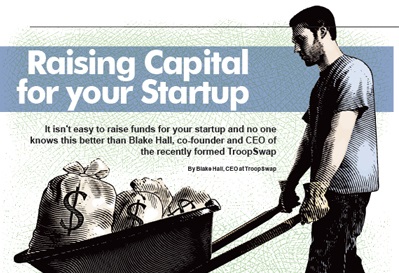Management Consulting: Not Just for Established Businesses
Although entrepreneurs in start-up mode commonly think that management consulting is utilized only by businesses that have established themselves or grown to a significant size, the truth is that early-stage companies can benefit from management consulting a great deal. While I’m clearly an evangelist for business consulting services, having seen firsthand how they can turn things around for troubled companies and help new businesses get off the ground, I don’t think I’m too biased when I say that the start-up phase is one of the times when management consulting is most useful.
The purpose of management consulting is largely to offer advice. And who can really afford to turn down the advice of a seasoned professional? Certainly not entrepreneurs who are growing a business from scratch – even if they’re experts in their industry. There’s always value in having someone review your plans, offer second opinions on ideas and help identify areas for improvement.
So here are 10 reasons why early-stage companies especially can benefit from management consulting.
1. Management Consulting Helps You Keep up with Changes
Businesses, old and new alike, existing in an ever-changing landscape. What’s relevant, timely and appropriate one day can be tired, outdated and inefficient the next. A good business consultant stays abreast of fluctuations, from market instability to technological improvements to changes in standards or best practices, so entrepreneurs can stay focused on their primary goal: launching successfully.
2. Management Consulting Provides Honest, Unbiased Feedback
An entrepreneur will get glowing feedback about his idea from family, friends and even his professional networks. Before you know it, he starts thinking his concept is foolproof. But truly unbiased and actionable advice is hard to come by unless you harness management consulting to take a look at the big picture. You’ll get feedback not only about the concept behind your business, but about the details of execution, organization and other critical matters. At Shared CxO, we pride ourselves on having outsourced executives who offer completely honest advice without the personal agendas or blinders that entrepreneurs will encounter when seeking feedback from others.
3. Management Consulting Solves Problems
In my experience working with incubators and interacting with entrepreneurs daily in the busy start-up scene in San Francisco, I’ve seen plenty of entrepreneurs hit brick walls at critical moments in their business’s development. Whether the obstacle stems from a lack of planning, a lack of research, a lack of knowledge about a particular facet of business or something else, I’m positive that management consulting can help frustrated entrepreneurs solve problems. And the more experienced an executive is, and the more diverse his background, the quicker he can untangle even the most complicated issues facing early-stage companies. That’s why we’ve cherry picked only the most seasoned business veterans to work with our clients.
4. Management Consultants Love Forward Momentum
Management consultants simply love to see a company grow and achieve its goals. As such, an outsourced executive providing management consulting is incredibly motivated to help entrepreneurs overcome issues and move forward with their plans. They triumph when the start-up’s off the ground. And it’s easy to get caught up in this excitement. It’s one of the reasons I love working with early-stage companies!
5. Management Consulting Teaches Entrepreneurs Valuable Lessons
A good management consultant doesn’t just drop by, solve everybody’s problems and disappear. In management consulting an executive guides entrepreneurs through the process of finding solutions for the stumbling blocks they encounter. Entrepreneurs actually learn from the engagement, and become better equipped to handle issues in the future.
6. Management Consulting Helps Entrepreneurs Stay Focused and on Deadline
Because of the sheer amount of activities involved in starting a business, it’s easy for entrepreneurs to lose focus unless guided. Management consultants can keep entrepreneurs laser-focused on the tasks at hand. Management consulting also involves prioritizing activities so that entrepreneurs have a step-by-step walkthrough for what has to happen before the big launch. I’ve also seen entrepreneurs lose track of time or spend too much time on one particular aspect of business, at the expense of others. Business consultants can keep things running on time.
7. Management Consulting Involves Top-to-Bottom Analysis
Quality business consultants leave no stone unturned when analyzing an early-stage business – from the initial concept to the business plan, market research, company structure and organization, and post-launch next steps, management consulting examines everything holistically. Management consultants, as experienced executives, catch overlooked aspects of starting up a company. They’re a second pair of eyes and ears to watch things carefully.
8. Marketing Consulting Sets Companies up for Branding
One of the biggest challenges for start-ups is simply being discovered. Brand awareness comes with tremendous time and effort, and often financial investment. Part of management consulting is teaching you how to plan an initial marketing campaign that gives your brand a shot in the arm. You’ll learn the channels that will produce the biggest ROI and how to create a scalable, practical plan so that you don’t exceed budget or spend too much time on a potentially fruitless activity.
9. Trust is Implicit in Management Consulting
I completely understand the “play your cards close to your chest” attitude that some entrepreneurs adopt from the get-go. Nothing could be worse than investing time, effort and money in a unique business idea, only to find parts of the idea or the idea in whole stolen by someone with more resources to make it happen. But in management consulting, an outsourced executive honors privacy without question. Entrepreneurs don’t have to worry about details of their business plan leaked – everything is kept strictly confidential, which is not always the case if you appeal to peers or professional networks for advice.
10. Management Consulting Dots I’s and Crosses T’s
With a management consultant on board, you’re no longer solely responsible for everything. Management consulting involves quality assurance and identification of areas of improvement. While entrepreneurs still need to be vigilant, with an executive on their side to help make sure everything is complete, correct and ready for the next stage of growth, they can have peace of mind.
Ready for Management Consulting? Take a look at our CEO advisory and outsourcing services and browse our membership packages, or contact us to discuss your needs.















